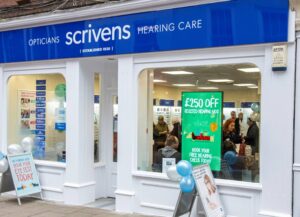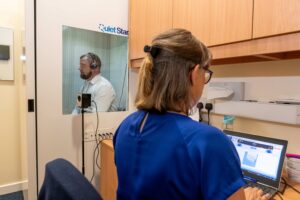Scrivens leader on UK audiology pathways: “Collaboration is inevitable!”
Mark Georgevic is well placed to make a vigorous contribution to any debate on how NHS hearing aids might be delivered free at the point of delivery within a future primary care set-up woven into centres belonging to approved NHS community providers from the private sector.
He directs 170 Scrivens stores in the UK, all offering hearing services, his vibrant group also boasting presence in over 100 medical centres across England. Since 2012, under the NHS internal market’s Any Qualified Provider (AQP) contractual system and provider collaboration models – set up to increase patient choice from among selected quality health services – Scrivens has been comfortably meeting the criteria of the AQP framework to patients’ satisfaction, says Georgevic.
Proposals to allow high street hearing aid providers to treat adult patients under a UK-wide NHS primary care mandate have been flown high in the sky by the campaign of another retail chain and AQP NHS signatory, Specsavers (see report). Were the campaign to lead to such a nationwide pathway change, Scrivens would comfortably deliver on its share of NHS patients, says its executive, stressing that his stores meet the requirements of the KPI (Key Performance Indicators) requirements mandated by the specifications set out by the ICBs and NHS England in their contracts.
“What’s happened since 2012 is that community providers have delivered an NHS service across the areas of country where AQP contracts have been enabled. We have committed to providing a high quality community service, gaining IQIPS-accreditation (Improving Quality in Physiological Services), the gold standard of service delivery in 2013 and more recently transitioning to IQIPS version 2. We have provided a service for hundreds of thousands of patients that are very happy with the service care that has been provided, are hearing better and started having a better quality of life sooner because they had access to our services.” affirms Georgevic, who qualifies his recognition of the “significant step change” of the AQP initiative by affirming that “it needs to be taken to the next stage”.
Emerging from the postcode lottery of NHS care
It is the blotchy geographic distribution of AQP, lying behind what its critics deem a postcode lottery, that is the “unacceptable” part of the system for Georgevic. “Everyone should have this option,” he argues.
“Contract boundaries rarely match the everyday movement of patients meaning you could work or shop in one area, but your GP is registered with a different area that does not use AQP services, and as such you can’t get NHS hearing aids from an approved NHS community provider. And we have that all across the country where there are AQP areas that are perhaps the shopping destinations of patients who live in an area where they can’t access independent community providers, and they are clearly on a waiting list,” he illustrates, but underlines that high street audiology services have not had the benefit of General Ophthalmic Services (GOS) contracts, which enable optical practices to deliver core primary care services nationwide to the public.
“Scrivens has been around since 1938, and optically we have a national GOS contract, so a proven model already exists for adult hearing services, and that’s why we are pushing for a primary care service.”
“With changes introduced in January of this year with the introduction of PSR (Provider Selection Regime) we now have a vehicle at local commissioning level to address audiology health inequalities. The regime at its core places a legal requirement for ICB/Commissioning bodies to have regard to the key principles of proper procurement and this is helpful in the short term. Although this is no substitute for a national primary care model, it does mean that at least current services should be procured in a fair and transparent manner for the benefit of patients.”
The strong argument of convenience
One of the bracing tenets of the call for a primary care mandate for independent community providers relates to convenience for patients with hearing loss, a population known to have needs of near or within pensionable age. Scrivens’ Director, Mark Georgevic, underlines this aspect: “The aftercare part of the delivery of that service is much more efficient if it is delivered on the high street, within a community setting, instead of having to travel to the hospitals. While I do accept that they have some outreach, and I’m not saying for one minute that patients shouldn’t have choice of where to have their service delivered, the convenience and accessibility of it being in a high-street store where, if you want to do your shopping, but you also want to pop in to get some advice about how to get maximum benefit from your NHS funded hearing aid, is very attractive, and has been shown to be very attractive since 2012.”

A Scrivens store in Bury St Edmunds.
Courtesy of Scrivens
“Patients want to be supported,” he continues, “and they want aftercare, and if they have a problem with tubing or sound or batteries or wax, for example, they want to be able to go to someone that is accessible, convenient and timely.”
He hastens to add: “And we have a good track record of being able to deliver on care within the specified time limits and agree with the British Academy of Audiology’s (BAA) Board’s positioning statement that we all should be offering services that meet minimum quality standards for the service and patients should not be waiting outside national targets for care.”
A difficult road towards collaboration
To date, no one could plausibly accuse stakeholders on either side of a knotty debate of lacking a realistic understanding of what is workable. Mark Georgevic is no exception, knowing that pathway changes ultimately may need a push from the Secretary of State for Health and Social Care as part of its Ten-Year Health Plan for the NHS and that to get to that stage and actually be financed, a polemic must be diluted by bringing positions together.
Georgevic points out that a solution will require “a significant element of collaboration. I think that is inevitable, and I think that’s in the best interest of patients.”
But tacking into the crosswind, Georgevic confronts the recent framing of the BAA’s stance, laid out clearly in a position statement that defends the capacity of the NHS to fully handle audiology at the primary care level, and discussed at length by the BAA’s President Sam Lear, and President Elect (current VP) Claire Benton in a recent interview in this publication.
“Clearly that article and the position statement particularly from BAA’s Board does not give us a huge amount of confidence,” says Georgevic.
While the Scrivens executive agrees with the BAA that any change “does need to be planned properly”, he argues that what should be considered is “a primary care service where there are dedicated referral routes into ENT and Trusts for more complex work.”
“I think that the BAA as an organisation has to look at this more widely in the best interests of patients.” continues Georgevic, stressing that “we are also collaborating with Trusts now because many Trusts simply don’t have the capacity to deliver the numbers of assessments and hearing aids within set assessment and fit times that we can do. I absolutely am not saying there is not a place for the Trusts to deliver hearing services; they should be part of the overall provision that enables NHS patients to have hearing aids that are effective, and that are delivered within a reasonable amount of time. And we can do that; we have been able to deliver that since 2012.”
The BAA position statement‘s assertion that three- to-five-year contract periods “can be disruptive to ongoing care”, meaning patients having to change their NHS provider, is also acknowledged by Georgevic, but on this he calls for approved community providers to be freed of the temporal limitations: “I absolutely accept that that is an issue. But if there was a primary care service whereby we weren’t time limited by three years or five years, having to renew and go out to tender all the time, we would continue to provide aftercare in a convenient community set of premises, and if that person no longer met the inclusion criteria for the types of hearing aids that we can deliver on behalf of the NHS, and if they require more complex services and skills, then the referral routes which are already being delivered in some ICB [Integrated Care Board] areas could be accommodated,” he continues.
“But for them to simply talk about the standpoint that they have adopted, on behalf of what I would say is NHS hospitals or audiology teams, is unsustainable and has proven to be unsustainable; there’s not going to be a magic money tree that is going to be produced by the new government for adult audiology. We should all be trying to collaborate to deliver a better service for patients.”
The role of NHS England; the lack of a unified profession
Who, then, should bring alignment on the issue? Georgevic is in no doubt that the role falls to NHS England, the executive body of the DHSC.
“I think the current hot air that’s being voiced by various organisations and companies about this at the moment needs to be trapped by NHS England,” maintains Georgevic.
“I’m confident we could deal with it within England, because that’s the bedrock of what we do. But it should be done in tandem with the hospitals. NHS England has a role, and the government has a role to try and move this thorny issue of hospitals and the independent community providers forward,” he adds.

“Patients want to be able to go to someone that is accessible, convenient and timely,” affirms Mark Georgevic, Director of Scrivens Opticians and Hearing Care.
Courtesy of Scrivens
As a founder and first Chairman of the professional grouping, the National Community Hearing Association (NCHA), does Mark Georgevic believe that if the profession was united under a single and much debated College of Audiology, this whole situation would be easier to move on?
“I think that a College would undoubtedly have helped because NHS England would have had discussions with the College, an independent College, who would have put solutions to them and would have been able to corral us all to delivering a better solution for patients,” posits Georgevic, adding that, although remaining optimistic, he sees the UK audiology community as currently “probably closer” to dealing with improving NHS services than with unifying as a College.
Georgevic’s optimism on finding a solution on the primary care pathway comes through strongly: “I think there’s a lot of momentum at the moment. Specsavers has pushed, the NCHA has also pushed. BAA are voicing their opinions. I think Wes Streeting [Secretary of State for Health and Social Care] and NHS England recognise that the waiting lists are not in a good place. I think the ENT waiting lists are not in a good place. I think the challenges with paediatrics have been seen with Lothian, and have all been debated in the media and by politicians and by NHS England,” he lists, concluding: “We are looking at a properly planned primary care service with training and career progression at all levels whereby routine hearing aids are delivered across the country in convenient accessible locations, that are NHS funded, that the routes for referral for more complex work are embedded in that system. But I can see challenges. I think NHS England is the right organ to move that forward with the new government and I am optimistic.”